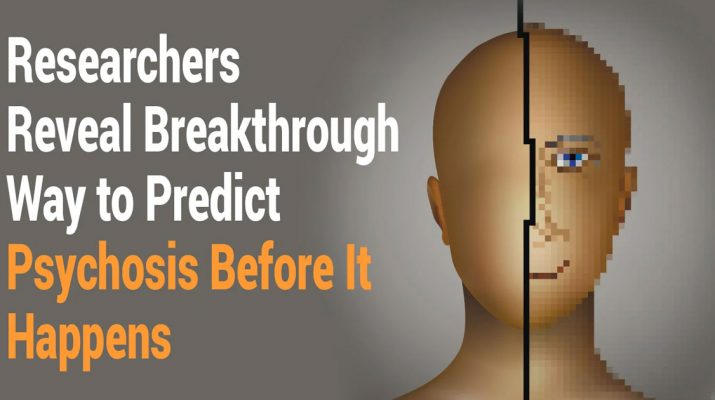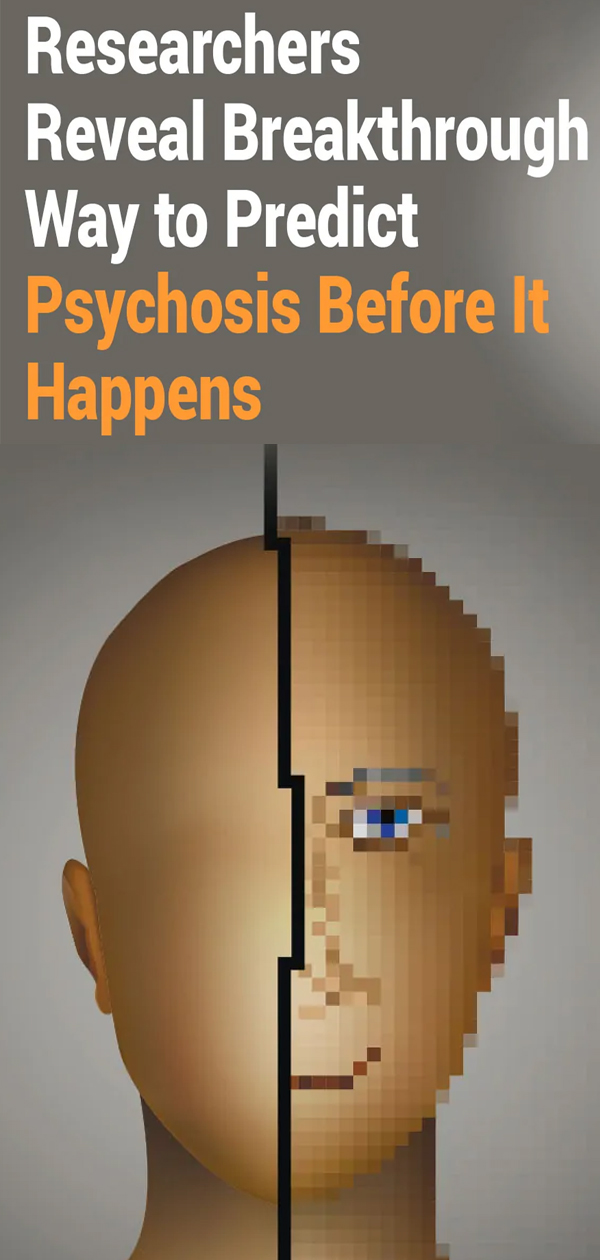Psychosis. The word alone raises alarm bells. Images come to mind of a dirty, ragged individual acting erratically, talking to himself or an unseen provoker, potentially angry or violent. For the family members and the victim, psychosis is a potentially devastating symptom of an illness that can destroy the future of the patient.
Psychosis can be treated, but it cannot be cured in certain diseases. For all mental illnesses, it’s a symptom of to what extreme places the mind can go without intervention. Early diagnosis is the best way to curtail the dangerous path psychosis can take.
Now an early diagnosis may be possible, or far closer than before, as researchers have revealed a breakthrough way to predict psychosis before it happens.
What Is Psychosis?
Psychosis is a broad term for a sensory experience that has no basis in reality. It is a symptom, not a diagnosis. The sensory experiences, according to Medical News Today, usually consist of:
- Hallucinations – interacting with things that are not really present but are believed to be perceived through one of the five senses. Most frequently, it is a voice directing or commenting to the person.
- Delusions – a strong belief that no amount of logic can dissuade. Usually, delusions are associated with “delusions of grandeur” or “delusions of paranoia.”
- In delusions of grandeur, the individual believes he is someone great. Most commonly, Jesus, God, or a great ruler/king.
- Delusions of paranoia consist of the belief that someone is trying to harm or kill you. That person can be anyone or a believed demon, devil, etc.
- Disorganization – this can show itself through behavior, speech, or thoughts.
- Disordered thinking – leaping from one subject to another with little to no correlation or connecting thoughts together that don’t fit (i.e. the sky is blue, so I am wearing red shoes).
- Catatonia – sitting, standing, or lying without responding to any stimuli.
- Difficulty concentrating – difficulty focusing due to increased thoughts or sensory perceptions.
What Illnesses Can Demonstrate Psychosis?
The average person most commonly associates psychosis with schizophrenia. Schizophrenia is a brain disease most often recognized as a mental illness.
A person must exhibit psychotic behavior sporadically for six months or more before they can be diagnosed. They must also not show other signs of illnesses that may cause psychotic symptoms.
Psychosis is not limited to schizophrenia. It can happen from a variety of diseases or causes. According to Psychology Today, three out of 100 Americans will have a psychotic event in their life at some point. Every year, about 100,000 teens or adults experience their first psychotic event.
Psychosis, while it does occur in mental illnesses like Bipolar Disorder or severe depression, can also occur in other conditions.
- Up to 50% of individuals with Parkinson’s display symptoms of hallucination.
- About 20% of people with a form of dementia called “DLB” show signs of visual hallucinations.
- Sleep disorders can create psychotic symptoms.
- People withdrawing from alcohol, cocaine, or meth often hallucinate.
Other causes can include:
- HIV
- Extreme cases of Postpartum depression
- Strokes
- A tumor or cyst in the brain
Diagnosing Psychosis
As with any pervasive illness, early diagnosis is critical. The earlier psychosis gets recognized, diagnosed, and treated, the better prognosis for lessening both the frequency and severity of the symptoms.
In diagnosing psychosis, there are certain symptoms that come to light before actual psychotic symptoms. After the psychotic symptoms have started, there can be different symptoms.
According to NAMI (National Alliance on Mental Illness), symptoms of “before psychosis” include:
- Job performance or grade decline
- Difficulty thinking clearly or able to focus
- Uncomfortable around and suspicious of other people
- Lack of hygiene
- Isolating themselves more often than usual
- Extremes of emotions – either extreme outbursts or apathy. These emotions may also demonstrate themselves inappropriately such as laughing at a sad scene in a movie.
After psychosis symptoms begin, the more obvious symptoms begin to show, in addition to the ones listed above:
- Hallucinations
- Delusions
- Further removed from friends and family
- More difficulty with mental tasks and concentration
The initial symptoms are referred to as a prodromal syndrome. Prodromal is a medical term used to categorize a group of symptoms that have been recognized to precede the onset of mental illness. It is this stage in which researchers have been focusing their research to better determine individuals at risk of developing psychosis.
Technology Using Speech Analysis To Diagnose Those At Risk For Psychosis
Amazingly enough, an AI analyzing speech density and the frequency in which a person discusses voices and sounds has proven to have a 90% accuracy in determining those at risk of developing psychosis. An article published in npj (nature research journal) details this research project conducted at Emory University and Harvard University by Neguine Rezaii, Elaine Walker, and Phillip Wolff.
Their theory rests on the fact that individuals tend to use language to display knowledge, thoughts, and behavior patterns through speech. By analyzing this pattern, a “digital phenotype” can be created.
The fact that our speech is a reflection of our thought process is vital in recognizing psychosis because the first elements of pre-psychotic symptoms lie in the decline of cognition and communication.
There are various studies referenced in the article which validate changes in verbal fluency, word comprehension, connecting words, and brevity of word use, to point to multiple stages of psychosis.
The Scientists Chose To Focus On Two Distinct Factors.
- Scarcity of word choice or use. This a pre-determining symptom to psychosis.
- The theory that auditory hallucinations may be able to be predicted due to the subject talking about voices and sounds more frequently.
- Hallucinations are an established psychotic symptom.
The foundation of language analysis is what is called semantic density, defined as the recognition that our common vocabulary usage is not usually technically accurate based on a literal definition. Rather, we tend to speak in the implications of societal understood phrases. Therefore, word choices, meanings, and phonetic use of these words change frequently.
They Utilized Two Different Methods To Ascertain Their Results.
- Vector unpacking: the splitting apart of semantic density and their meanings, then dividing the number of words in a sentence to determine the fullness of the meaning in the sentence. The goal is to determine the core essence of the sentence.
- Latent content analysis: Comparing how the subject uses language in comparison to a broader audience. In the case of this study, the contrast was 30,000 individuals on Reddit.
The Specific Markers They Analyzed Semantic Density Consisted Of.
- Idea density: related to the number of propositions used in a specific vector.
- Information value: the amount of information relayed in a vector length.
- Poverty of speech: comparison of semantic density vs the amount of speech produced.
The results of this study demonstrated that individuals later diagnosed psychotic during the two-year follow-up had displayed a lack of sentence variety (semantic density). They also demonstrated an increased slant toward conversations about voices or sounds.
The accuracy of prediction was 93%.
While this study consisted of a small number of participants (40 people), the potential for such an aid to help in early diagnosis in the future is the answer to a prayer for many.
Treatment For Psychosis
Treatment for psychosis as it relates to mental illness should be multi-focused. NAMI referenced the National Institute of Mental Health who conducted a study that outlined the better treatments for psychosis.
The core of the results stated that having a Coordinated Specialty Care program available proved to be the most effective for the patient and family members. Patients tended to stay in treatment longer also. The care team has several points of focus:
- Support and Education for the Family. Psychosis doesn’t just affect the patient, but also the family. It helps to ease stress if the family understands the illness, psychosis, various programs available, etc.
- Going through the symptoms of psychosis, and the underlying cause of the psychosis can do a number on your self-esteem and view of the future. It is important that one speaks to a therapist. Additionally, therapy also helps to teach you how to recognize and handle your symptoms in a pro-active manner to decrease the length and severity of the episodes.
- Medication management. Finding medication that can effectively treat the psychosis and the underlying cause can be a frustrating, time-consuming process. Yet, studies have shown that individuals have a better life once that proper formula is found.
- Education and employment assistance program. It is essential that the patient doesn’t feel as if his education or employment is lost. A supportive team will find programs to ensure continued education in a safe environment. They can also explore employment opportunities.
- Peer support. Any illness creates the illusion that the victim and the family are alone. Meeting with other families and individuals who are coping and finding solutions is a fabulous way to not feel alone.
Conclusion:
Psychosis does not need to cripple an individual for life. There are many programs available to assist victims and families to better cope and treat the symptoms with the underlying causes. Early diagnosis is key to making psychosis as minimally impactful as possible.
This breakthrough way to predict psychosis before it happens through speech is remarkable, and we look forward to future findings and tools to make this a reality.
If you suspect your teenager, partner, sibling, or friend may be experiencing symptoms related to psychosis, please do not be afraid to speak to them and try to get help for them.


